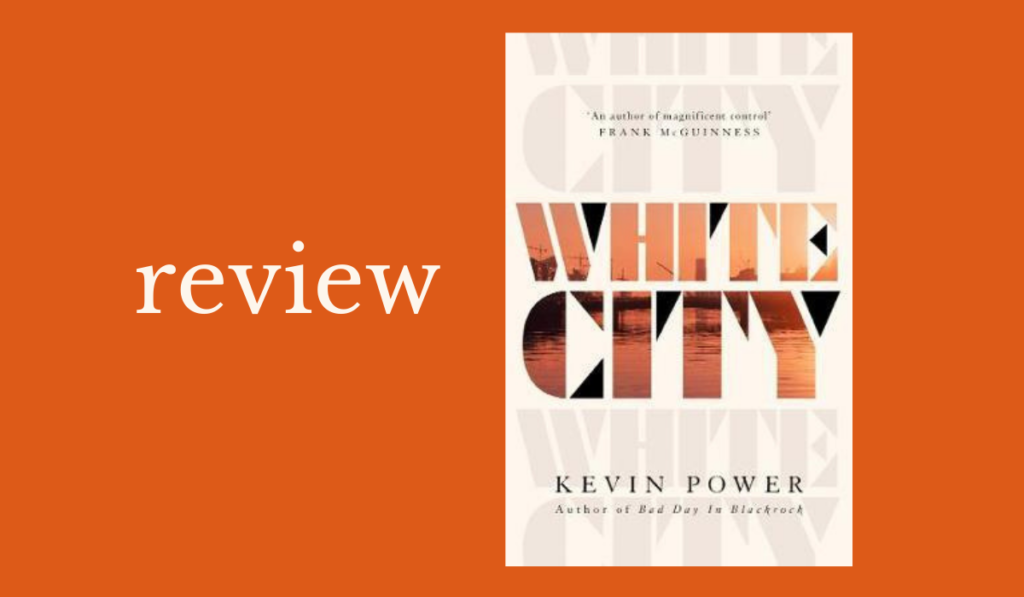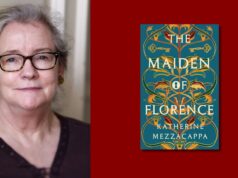
White City|by Kevin Power| Scribner UK|hardback £14.99|ISBN: 9781847378064
by Stephen Reid
‘I am a sick man … I am a spiteful man’ Dostoyevsky wrote in Notes from Underground. Ben, the narrator of White City changes only one word of this to open his own confessional rant—but in place of spite, Ben has anger.
There’s a register that Power has found here, a narratorial style of delivery through Ben—self-aware, preening, hyper-articulate, desperate and pompous— which is so sure-footed and measured that it sings: character, theme and intent knit so finely they become seamless.
Ben is the narrator of the novel, and also in ways, its author. We first find him holed up in the St Augustine Wellness Centre for Drug and Alcohol Rehabilitation in South Dublin, where he has been instructed by his sardonic therapist, Dr Felix, to ‘write it all down … In your own words’. ‘Don’t start with your father,’ Dr Felix adds, ‘start with something easier. Your girlfriend, maybe. Or your friends.’ Bitterly accepting the gauntlet thrown down, Ben begins to write, but warns: ‘Trust nothing, Dr F, from here on out.’
If only Ben had paid heed to this advice himself.
His story begins with the arrest of his father who stands accused of stealing six hundred million euro from his own investment bank, Atlas-Merritt plc. The family’s life is thrown into disarray as their finances are frozen. Imagine Schitt’s Creek by way of Ballsbridge. Twenty-seven year old Ben, four years and two-thousand words into a half-hearted PhD on James Joyce, is confronted with the first real obstacle of his life. Around this time, he begins a relationship with Clio, an aspirant actress who behaves as a kind of mirror for his self-esteem. She supports his ego, allows him to live in her apartment, and fatefully introduces him to narcotics.
Once the family fortune dries up, Ben replaces its numbing effects with drugs – and soon embalms himself in a fugue state of inebriation. There’s a dependency to both money and drugs here – or rather, a dependency upon what they facilitate: ‘freedom’ on the one hand, blissful ignorance on the other.
Faced with an ultimatum by Clio, who isn’t blind to his increasing dependence on drugs and her finances, Ben begrudgingly finds his first job at BlueVista Marketing Solutions, a B2B lead generation firm. Power himself has previously written – in an eloquent essay for The Dublin Review – about his own time working in a call centre after the publication of his first novel. The relentlessly depersonalising environment of BlueVista is such a shock to Ben’s system that, when a former schoolmate, James Mullens, approaches him with an opaque plan to solve all of Ben’s financial and existential problems in one fell swoop, he grabs it with both hands.
Mullens’s plan involves using a newly minted REIT, or Real Estate Investment Trust (The same REIT in the news this week), to abuse legal tax loopholes between Ireland and Serbia. ‘It’s not illegal,’ Mullens assures Ben, ‘some people might have ethical issues with it. But I wouldn’t be doing it if it was proper shady.’ The plan is to build a hotel and golf complex along the Serb-Bosnian border, an area of land specially chosen by the Serbian investors with malicious intent. ‘Build’ might be a strong word. Once the deal is signed, Mullens and Co. plan to bolt with the cash from the deal, leaving the Serbs holding the bill; an arrangement all too familiar to Irish tax payers. Ben begins to hatch his own tenuous plans to game the system further, and make off with his easy-won profits to a vague isolated idyll, leaving repercussions, girlfriend and family woes behind.
Ben receives a hefty ‘signing bonus’ from Mullens, and starts renting a ludicrously expensive apartment in a complex called ‘The Brokerage’, where he wakes each day after noon and ‘self-medicates’ until dawn. So far, too good. The plot moves to Serbia in the second act, where the absurdities and tensions mount. The fact that the narrative is framed squarely through Ben’s eyes means that many of the possible faults with the novel – the underdevelopment of Clio, his girlfriend, or the comedically caricatured depiction of Serbia and its people – can be seen as by-products of Ben’s skewed perspective, and in so, true to the reality of his story.
If the Serbian characters in the novel are caricatures, then ‘The Lads’ – Mullens’s business cadre of dapper Dublin dunces – don’t fair much better; they exist in the novel as a kind of homogenous interchangeable entity, the Large Adult Sons let abroad, replete with creatine muscles, frosted nostrils, BESS degrees and inherited financial bulwarks. Behind The Lads stand The Dads – a line-up of Irish captain-of-industry types cut from the mould of Sean Quinn and Seán Fitzpatrick – whose part in the whole affair may be more complex than it seems.
One of the things truly interesting about White City is that it is a deeply compelling novel constructed primarily out of clichés. Power manages to make these familiar elements operate in new, satisfying ways.
The style of Power’s writing shines in his awareness of the aesthetics of Ben’s world, channelling that aesthetic through Ben’s use of language and imagery.
Night skies resemble ‘a black cloth, webbed with diamante-stud stars like a cheap debs dress’, in Serbia, as he looks to the mountains ‘a low horizon of saw-toothed peaks charted its blunt NASDAQ of booms and busts.’ The book is also, notably, hilarious. Power’s control over tone, delivery, and the slow release of paragraph’s energy are masterful. There’s an exuberance in the fevered density of the text that shows a writer enamoured with what language can do.
One of the things that makes Ben such a compelling character – and so profoundly frustrating—is his determination to remain unaware of the facts, to stay out-of-the-know. It’s fascinating how Power has so seamlessly woven this intricate plot together, while allowing the reader to be guided by a narrator who is relentlessly, wilfully ignorant of what is going on around him.
White City is one of the best Irish novels of the decade, a novel deeply of the decade that produced it. It is, at its centre, a novel of familial disintegration, with the putrid morals of corporate, nihilistic capitalism as its core, marbled with rich veins of empathy, heart and humour.

Stephen Reid works as an Assistant Editor with New Island Books and as a Sales Agent with Brookside Publishing Services












